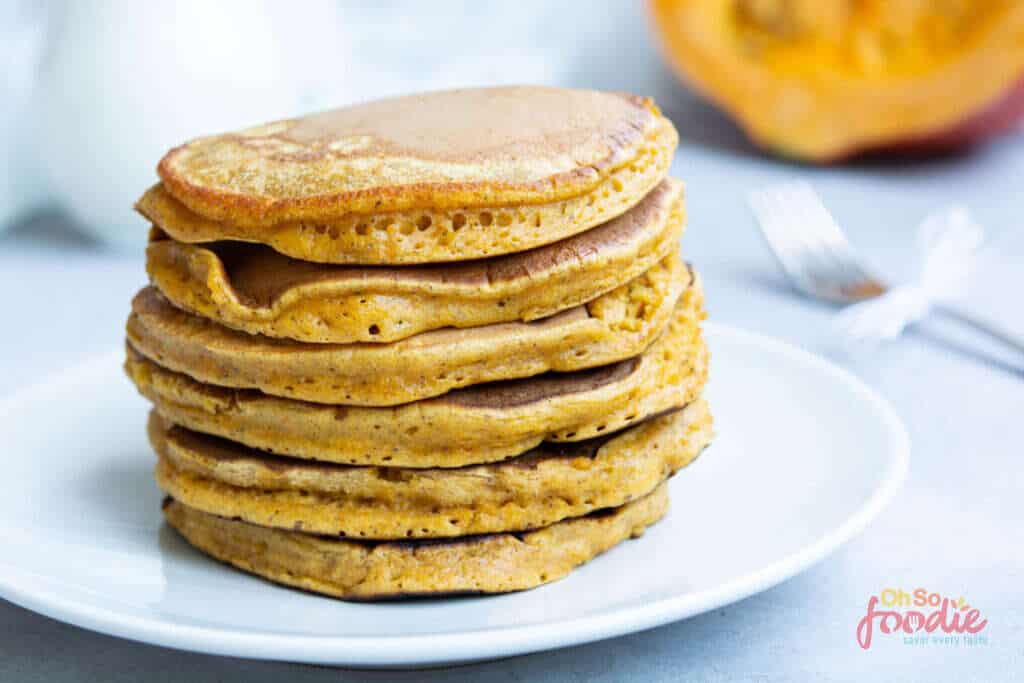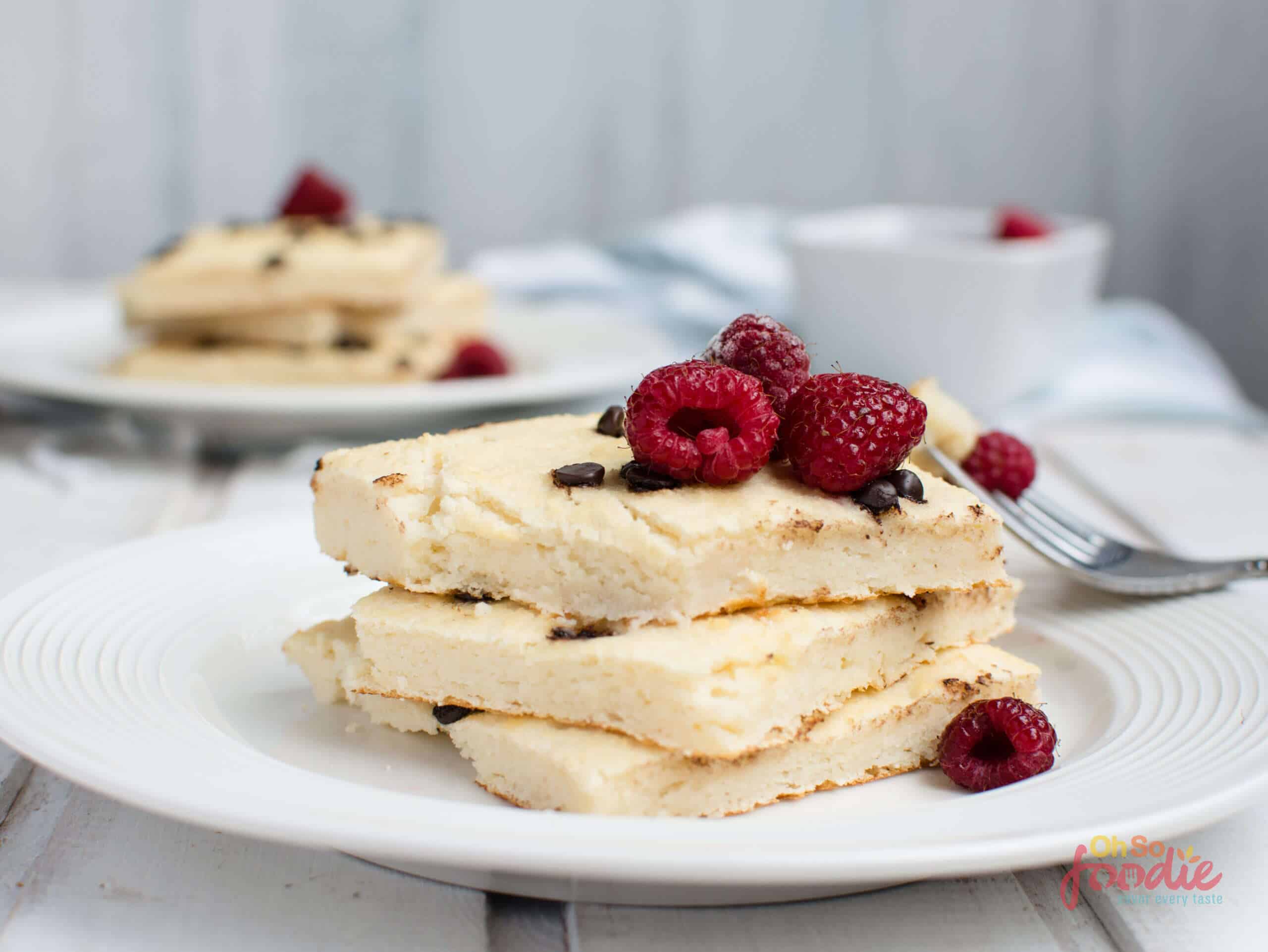Last Updated on June 24, 2023 by Toya
Check out the top 19 ways to substitute for flour in pancakes!
Most pancake recipes call for all-purpose flour. However, if you’ve recently changed your way of eating or you just want to try something different here are some of the easiest substitutes for flour in a pancake recipe.
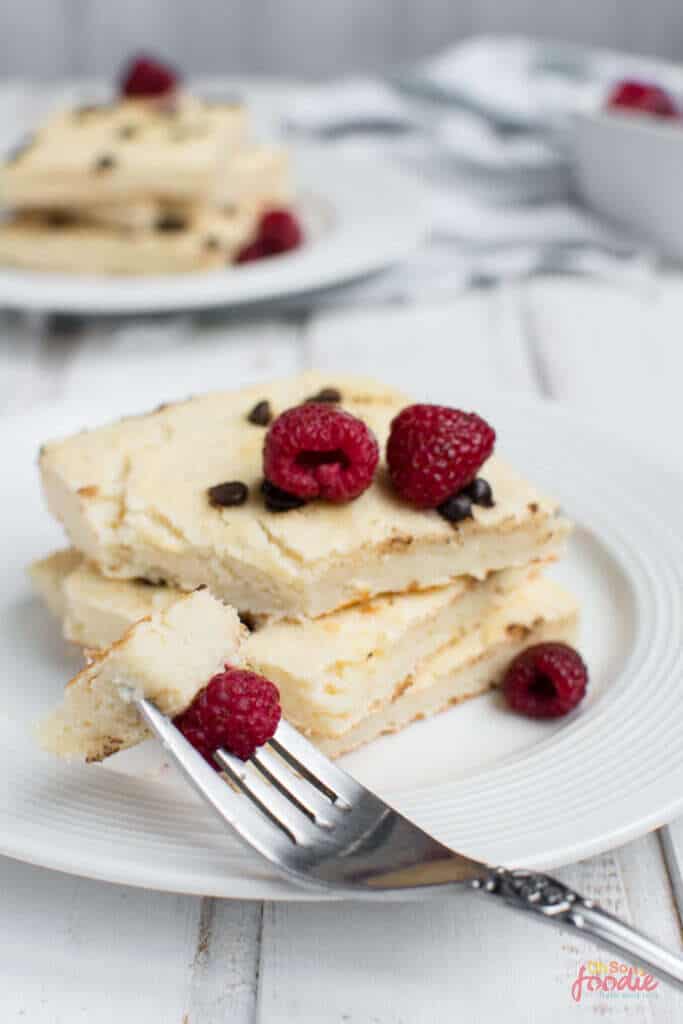
What are some great flour alternatives for pancakes?
The best options are:
- Cake flour
- Self-rising flour
- Pastry flour
- Whole wheat flour
- Oat flour
- Coconut flour
- Almond flour
- Cashew flour
- Cassava flour
- Chickpea flour
- Quinoa flour
- Rice flour
- Sorghum flour
- Lupin flour
- Oats
- Whey protein powder
- Cornmeal
- Cream cheese
Best ways to substitute for flour in pancakes
Cake flour
Cake flour is the perfect flour substitute for pancakes. Cake flour is a low-protein flour milled from soft wheat. It makes the lightest, fluffiest pancakes ever.
A good conversion of cake flour for all-purpose flour is 1 cup + 2 tablespoons of cake flour for every cup of all-purpose.
Self-rising flour
Self-rising flour is a type of flour with some baking powder and a bit of salt already added. Therefore, it’s an excellent sub for all purpose flour in pancakes since it saves you from having to add baking powder.
One cup of self-rising flour is enough to replace 1 cup of all-purpose flour in pancakes or a 1:1 conversion.
Pastry flour
Another simple, yet effective flour replacement for pancakes is pastry flour. You can easily replace all-purpose with pastry flour using a 1:1 ratio.
Whole wheat flour
Whole wheat flour makes for some nutritious, fluffy pancakes if you follow the right recipe. Whole wheat flour makes a very thick pancake batter, but this is in part what leads to the super fluffy pancakes that result.
Whole wheat flour is heavier and denser than plain flour, so a good substitute is 113 grams (or 1 cup) of wheat flour for every 120 grams (or 1 cup) of all-purpose flour.
Oat flour
Oat flour is a common all purpose flour substitute for pancakes.
Oat flour is made by grinding oats into a fine powder. Although it has a mild flavor, it is denser and texturally different than plain flour. Also, it has no gluten, so, on its own, it lacks structure.
Therefore if you’re using oat flour to replace all purpose flour in a pancake recipe, make sure to use a binder. The most popular pancake binders are added eggs, xanthan gum, guar gum, or even psyllium husk powder to help hold the pancakes together so they keep their structure.
1 cup of all-purpose flour weighs more than 1 cup of oat flour. That is 1 cup of oat flour weighs 88 grams while 1 cup of all-purpose flour weighs 120 grams. Therefore, if you’re trying to replace plain flour with oat flour in a recipe, a 1:1 substitute will not work since you won’t be using enough oat flour for that recipe.
Instead, if you have a food scale, measure out 120 grams of oat flour to replace 120 grams of plain all-purpose flour.
However, if you do not own a food scale, then Detoxinista recommends multiplying the number of cups of all-purpose flour by 1.4. That is if a recipe calls for 1 cup of all-purpose flour and you want to use oat flour instead, multiply 1 cup by 1.4 which is equal to 1.4 cups.
1.4 cups is equal to 1 ⅖ cups which is also equal to 1 cup + 6.4 tablespoons.
So, you’ll need 1 cup + 6.4 tablespoons of oat flour to replace 1 cup of all-purpose flour.
Coconut flour
Another common flour substitute for pancakes is coconut flour. Coconut flour is a keto-friendly, gluten-free flour made from drying and grinding coconut meat into a fine powder.
Coconut flour has many characteristics that are different from plain flour. It is drier, so you usually need to use less coconut flour when substituting. It has no gluten, so this type of flour needs binders like eggs, xanthan gum, psyllium husk powder, cream cheese, etc to help keep the pancakes from crumbling.
It has a distinctive coconut flavor compared to mild-tasting plain flour.
It is also more nutritious and more expensive.
But, if you want to use coconut flour to make pancakes, a good substitute ratio is ¼ cup of coconut flour for 1 cup of regular flour of a 1:4 ratio.
Also, add an egg for every ¼ cup of coconut flour you use in a pancake recipe so the cooked pancakes don’t fall apart. I’ve shared many coconut flour pancake recipes on my blog so feel free to check them out.
Almond flour
Almond flour is made by blanching, then grinding almonds into a fine powder. Almond flour is a great all-purpose flour replacement in pancakes and can be substituted at a 1:1 ratio.
Two important things to note:
- Almond flour has a mildly sweet, nutty flavor so it isn’t mild like plain flour. This nutty, sweet flavor will translate to your pancakes.
- Almond flour is gluten-free, so it needs eggs, or binding agents like xanthan gum to keep the pancake structure intact. These binders prevent the almond flour pancakes from crumbling. Take a look at my simple recipe for almond flour sheet pan pancakes to see how to use this type of flour.
Cashew flour
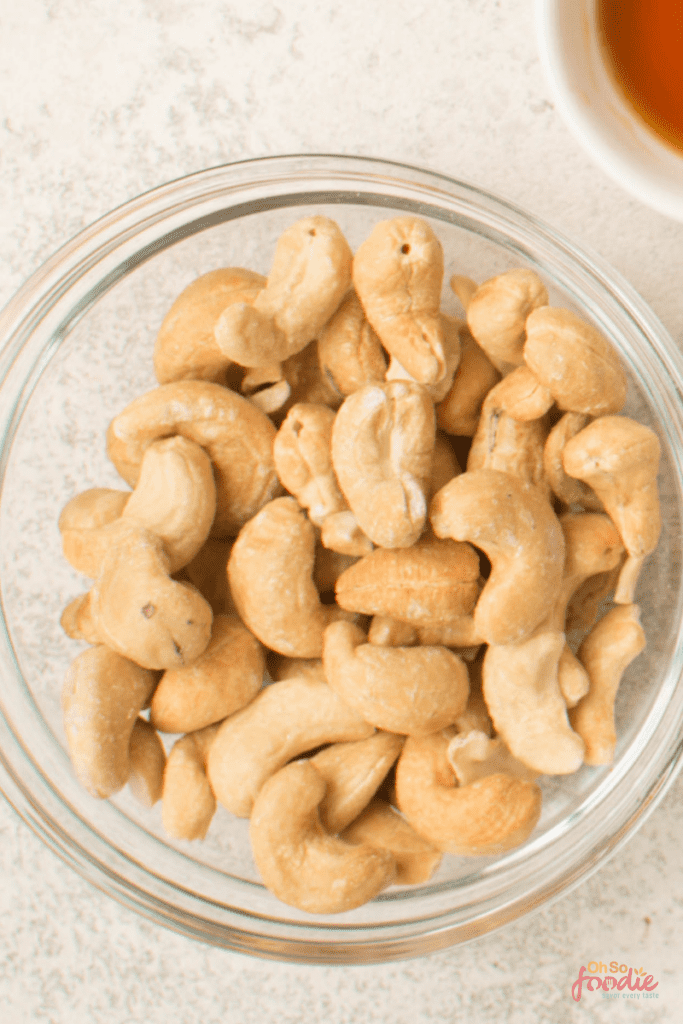
Another great sub for flour is cashew flour. If you’d like to use cashew flour instead of all-purpose flour in pancake recipes you can go right ahead since cashew flour is a great 1:1 swap for plain flour.
It is gluten-free though, so it will benefit from binding agents. Also if you don’t have cashew flour, or you find them too expensive, you can make your own by grinding raw cashews in a high-speed blender!
Cassava flour
Cassava flour is a good choice of flour for making pancakes. Cassava flour is a starchy type of flour made from yuca roots that have been dried and ground into a fine powder.
It is gluten-free and paleo and can be substituted at a 1:1 ratio. Three important things worth noting:
- Although cassava flour can be substituted for all purpose flour at a 1:1 ratio, it is always recommended that you start with less, then adjust as needed. So, if a recipe calls for 1 cup of all purpose, start by replacing this with ¾ cup of cassava flour. Then assess the batter and add more if necessary.
- Secondly, let the mixed batter sit for about 5 minutes before making your cassava flour pancakes. This will allow the cassava flour to absorb the liquid in the batter. The finished product is much better that way.
- Eggs are an important part of cassava flour pancakes since they help to give the pancakes structure.
Chickpea flour
Chickpea flour is a type of flour made from milling dried garbanzo beans. Chickpea flour has a neutral, slightly nutty, slightly beany flavor that makes earthy-tasting pancakes.
Quinoa flour
A nutritious, hearty whole-grain flour like quinoa flour can be used to make fluffy pancakes! Quinoa flour is often used to make vegan pancakes, but you can use it to swap with all-purpose if you’re all out too.
If you want to use quinoa flour to make pancakes, a good substitute ratio is ½ cup of quinoa flour for 1 cup of regular flour of a 1:2 ratio.
Rice flour
If you have it, rice flour can also be a good alternative for flour in pancakes. Rice flour is made by grinding the inner kernels of brown or white long-grain rice until it becomes a fine powder.
Some brands of rice flour can be gritty, so make sure to look for the finest type of rice flour possible.
Also, rice flour pancakes won’t taste like regular pancakes made with all-purpose. But, if you want some gluten-free pancakes, rice flour is a good choice.
Also, rice flour is gluten-free so it needs eggs, or another binder like guar gum, or xanthan gum to help the pancakes keep their structure.
Sorghum flour
Sorghum flour is another great all-purpose flour substitute for pancakes. According to American Sorghum, sorghum flour can be swapped for all-purpose flour at a 1:1 ratio for basically any recipe.
Lupin flour
Lupin flour is a keto-friendly flour that can be used as a good substitute for all-purpose flour in pancakes.
Oats
Whether it’s old fashion rolled oats or quick oats, you can use oats to make yummy oatmeal pancakes. I recommend you follow a recipe for the best tips. But generally, you’ll start by adding 1 cup of raw oats, and 1 cup of milk (or a handy whole milk substitute for pancakes) to a bowl for about 10 minutes so the oats soften up a bit.
Once the time is up add the other pancake ingredients including a sweetener, eggs, baking powder, cinnamon, a little bit of your flour of choice, and some salt. Mix well then cook the pancakes!
Do not use steel-cut oats for your pancakes!
Whey protein powder
Unflavored whey protein powder makes amazing protein pancakes! They’re a great choice for keto-friendly pancakes since unflavored protein powder has 0 net carbs.
Cornmeal
Cornmeal can be used to make pancakes. These types of pancakes are not a very popular choice, but if you happen to have some in your kitchen, then you can make delicious pancakes.
Cornmeal is gluten-free, so it’s often used other with eggs, and other binders like xanthan gum.
If you want to see how to make cornmeal pancakes, check out this simple cornmeal pancake recipe for more tips.
Cream cheese
You may not believe but I’ve made pancakes without flour that had just cream cheese, eggs, and a few other ingredients. These pancakes are a good choice for people following a keto lifestyle.
Want some more ideas, check out some of my favorite pancake recipes made without all-purpose flour below.
Pancakes Made With Flour Substitutes
Coconut flour cream cheese pancakes
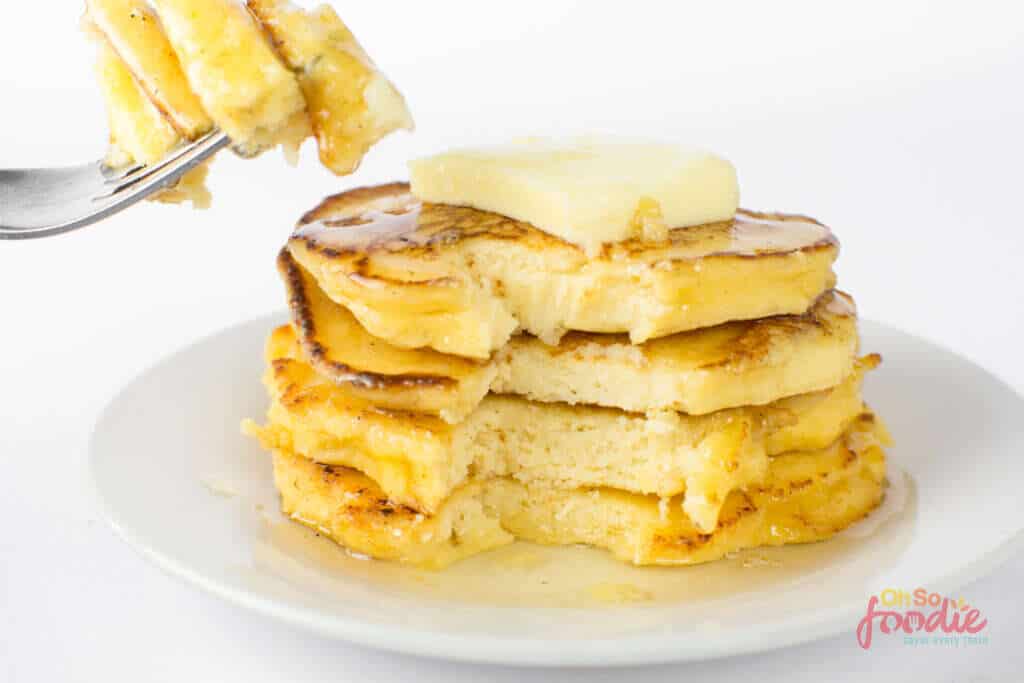
Almond flour coconut milk pancakes
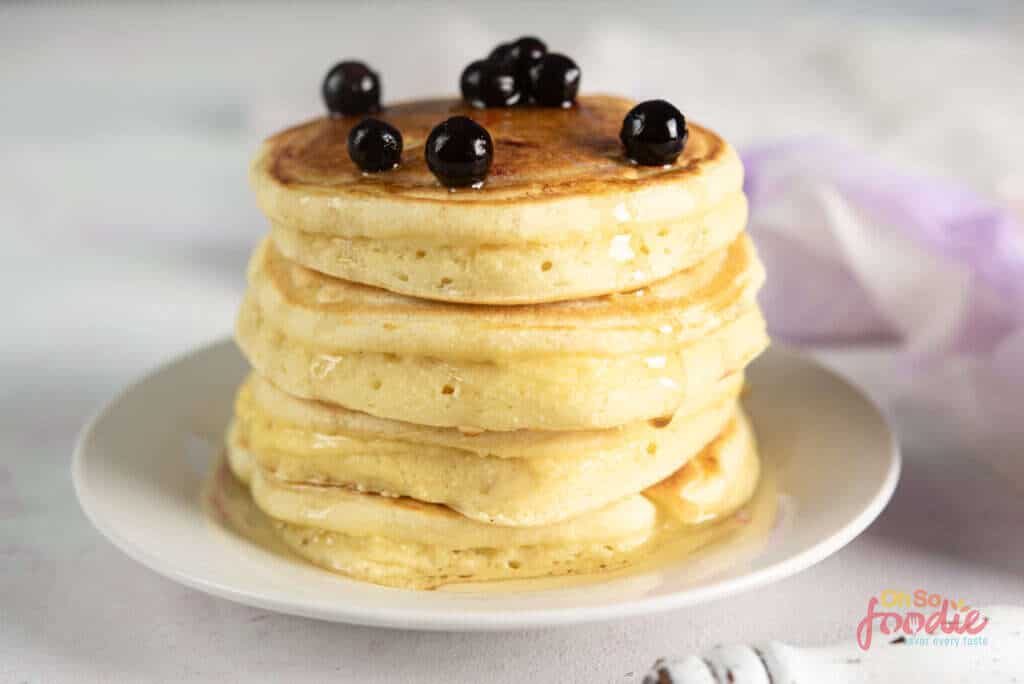
Almond flour pancakes with 3 ingredients
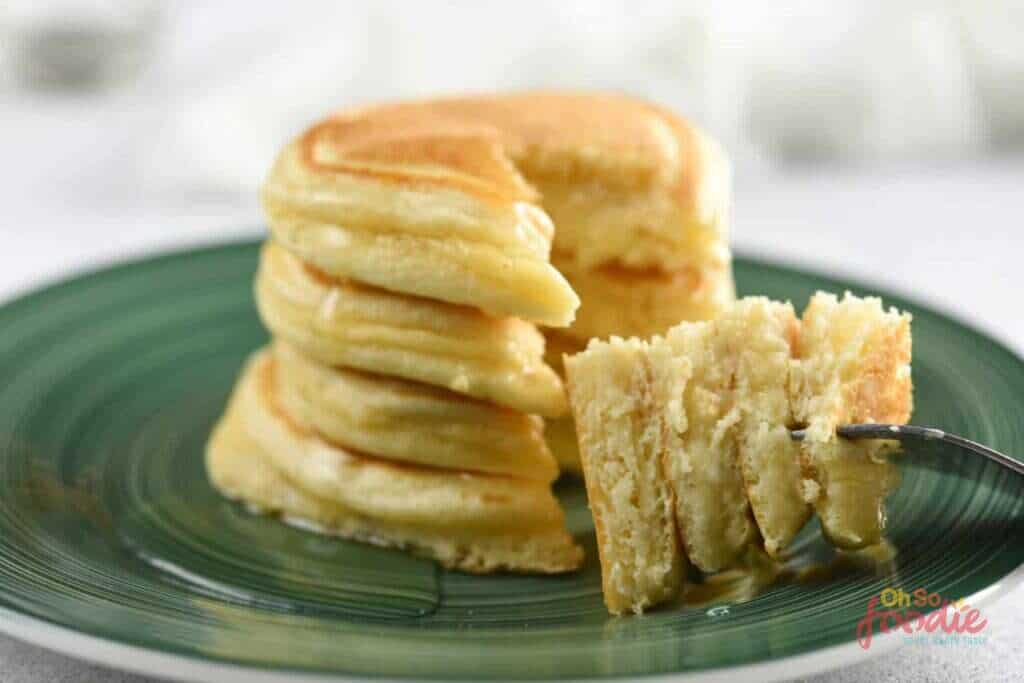
Easy cream cheese pancakes with psyllium husk powder
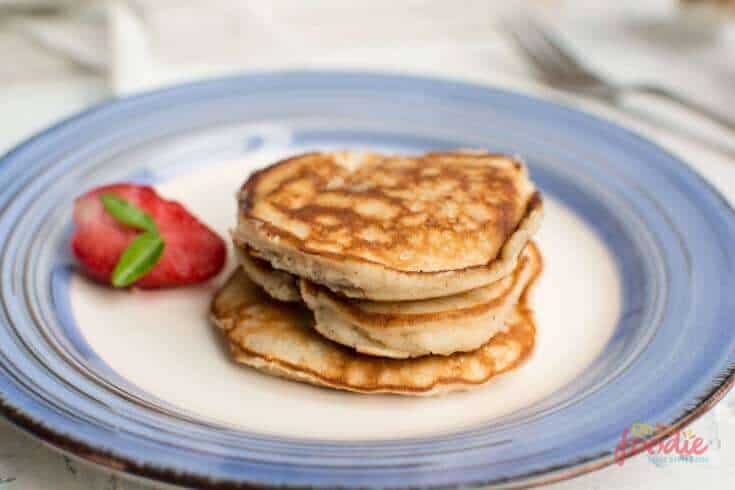
Coconut flour pumpkin pancakes
